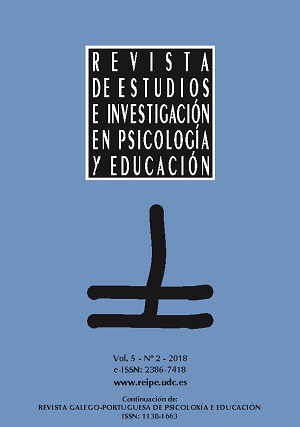Romantic love myths in a sample of trainee teachers
Main Article Content
Abstract
Keywords:
Downloads
Article Details
References
Azorín, C. M. (2017). Actitudes hacia la igualdad de género en una muestra de estudiantes de Murcia. Revista Complutense de Educación, 28(1), 45-60. https://doi.org/10.5209/rev_RCED.2017.v28.n1.48715
Bosch, E., Ferrer, V. A., García, M. E., Ramis, M. C., Mas, M. C., Navarro, C., & Torrens, G. (2008). Del mito del amor romántico a la violencia contra las mujeres en la pareja. Madrid: Instituto de la Mujer.
Bosch, E., Ferrer, V. A., Ferreiro, V., & Navarro, C. (2013). La violencia contra las mujeres: el amor como coartada. Madrid: Anthropos Editorial.
Caro, C., & Monreal, M. C. (2017). Creencias del amor romántico y violencia de género. International Journal of Developmental and Educational Psychology, 2(1), 47-56. https://doi.org/10.17060/ijodaep.2017.n1.v2.917
Ferrer, V., & Bosch, E. (2013). Del amor romántico a la violencia de género: Para una coeducación emocional en la agenda educativa. Profesorado: Revista de currículum y formación del profesorado, 17(1), 107-122. http://www.ugr.es/local/recfpro/rev171ART7.pdf
Flecha, A., Puigvert, L. & Redondo, G. (2005). Socialización preventiva de la violencia de género. Feminismo/s, 6, 107-120. https://doi.org/10.14198/fem.2005.6.08
García-Pérez, R., Rebollo, M. A., Vega, L., Barragán-Sánchez, R., Buzón, O., & Piedra, J. (2011). El patriarcado no es transparente: competencias del profesorado para reconocer desigualdad. Cultura y Educación, 23(3), 385-397. http://doi.org/10.1174/113564011797330298
Hair, J. F., Anderson, R. E., Tatham, R. L., & Black, W. C. (1999). Análisis Multivariante. Madrid: Prentice Hall Iberia.
Herrera, C. (2014). Amor romántico y desigualdad de género. Revista Feminista Casa de la Mujer, 20(2), 79-95. http://repositorio.una.ac.cr/handle/11056/11524
Lorente, M. (2007). Violencia de género, educación y socialización: acciones y reacciones. Revista de Educación, 342, 19-35. http://repositorio.minedu.gob.pe/handle/123456789/1279
Mosteiro, M. J., & Porto, A. M. (2017). Análisis de los estereotipos de género en alumnado de formación profesional: diferencias según sex, edad y grado. Revista de Investigación Educativa, 35(1), 151-165. https://doi.org/10.6018/rie.35.1.257191
Nava-Reyes, M. A., Rojas-Solís, J. L., Greathouse, L. M., & Morales, L. A. (2018). Gender roles, sexism and myths of romantic love in Mexican adolescents. Revista Interamericana de Psicologia, 52(1), 102-111. https://doi.org/10.30849/rip/ijp.v52i1.341
Pérez, M. D. (2007). La violencia de género: prevención educativa. Papeles Salmantinos de Educación, 8, 73-94. https://dialnet.unirioja.es/servlet/articulo?codigo=2321865
Rodríguez, Y., & Alonso, P. (2015). Análisis de los discursos de los y las jóvenes sobre la violencia en las relaciones de pareja. Revista de Estudios e Investigación en Psicología y Educación, Extr.(2), 15-18. https://doi.org/10.17979/reipe.2015.0.02.235
Rodríguez-Castro, Y., Lameiras-Fernández, M., Carrera-Fernández, M. V., & Vallejo-Medina, P. (2013). La fiabilidad y validez de la escala de mitos hacia el amor: las creencias de los y las adolescentes. Revista de Psicología Social, 28(2), 157-168. https://doi.org/10.1174/021347413806196708
Yela, C. (2003). La otra cara del amor: Mitos, paradojas y problemas. Encuentros en Psicología Social, 1(2), 263-267.



